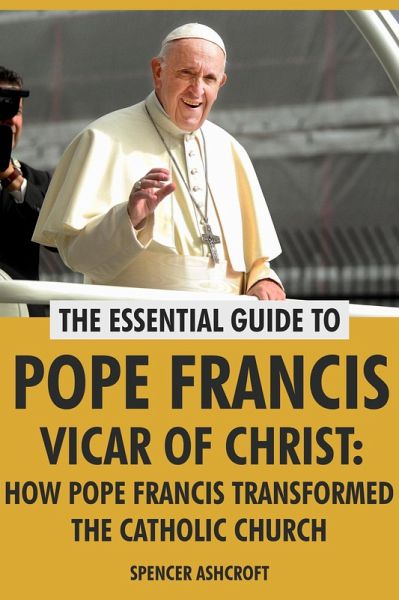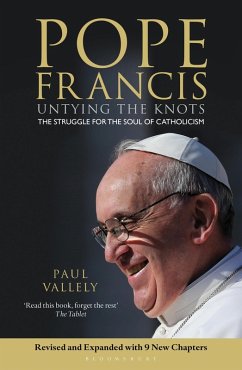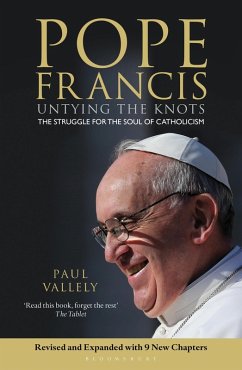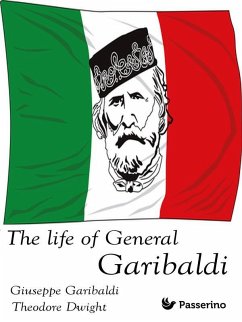
Pope Francis Vicar of Christ: How Pope Francis Transformed the Catholic Church (eBook, ePUB)

PAYBACK Punkte
0 °P sammeln!
Pope Francis, born Jorge Mario Bergoglio in Buenos Aires, Argentina, in 1936, has emerged as one of the most influential and beloved figures in the world today. His papacy, which began in 2013, is marked by his deep commitment to social justice, humility, and a willingness to challenge the traditional structures within the Church. As the first Jesuit pope and the first from Latin America, Pope Francis brought a fresh perspective to the Vatican, one rooted in compassion, simplicity, and a profound sense of service to others.Before he was elected the 266th pope of the Roman Catholic Church, Jorg...
Pope Francis, born Jorge Mario Bergoglio in Buenos Aires, Argentina, in 1936, has emerged as one of the most influential and beloved figures in the world today. His papacy, which began in 2013, is marked by his deep commitment to social justice, humility, and a willingness to challenge the traditional structures within the Church. As the first Jesuit pope and the first from Latin America, Pope Francis brought a fresh perspective to the Vatican, one rooted in compassion, simplicity, and a profound sense of service to others.
Before he was elected the 266th pope of the Roman Catholic Church, Jorge Bergoglio was a Jesuit priest who dedicated much of his life to the service of others, particularly the poor and marginalized. His time as the Archbishop of Buenos Aires, where he gained a reputation for his pastoral care, focus on social justice, and a preference for living a simple life, laid the foundation for the leadership style he would carry with him into the papacy. His deep faith and understanding of the struggles faced by everyday people shaped his vision for the Church as an institution that should be more focused on the needs of the marginalized than on its own power and prestige.
Pope Francis' election as the leader of the global Catholic Church came as a surprise to many. Despite being a contender for the papacy, he was not the frontrunner, and few expected him to be chosen. Yet, his election signaled a new era for the Church. His selection was seen by many as a sign of hope for a more inclusive and compassionate direction for the Church, one that emphasized mercy over judgment and outreach over insularity.
Throughout his papacy, Pope Francis has championed numerous causes, from environmental issues to the rights of refugees, from interfaith dialogue to promoting peace in regions affected by conflict. His encyclicals, such as Laudato si' on the environment and Fratelli tutti on social friendship, reflect his deep concern for the common good and his call for a world that is more just and inclusive. His leadership has focused on compassion for the poor and a desire to build bridges between different faiths and communities. His personal example of humility - living in the Vatican guest house rather than the papal apartments, washing the feet of refugees during Holy Week, and frequently calling for reform within the Church - has made him a figure admired not only by Catholics but also by people of all faiths and backgrounds.
Pope Francis' vision for the Church is one of renewal, a Church that listens to the cries of the poor, reaches out to those on the margins of society, and promotes the values of love, peace, and justice. At the heart of his papacy is the theme of mercy - a concept that has shaped much of his teachings and public statements. He believes that the Church's primary mission is to extend God's mercy to the world, to welcome sinners, and to offer hope to the hopeless. For Pope Francis, the Church should not be a place of exclusion but one of inclusion, where all are welcome, no matter their past or present circumstances.
In this eBook, we will take a closer look at the life and papacy of Pope Francis, exploring his early years, his formation as a Jesuit, his leadership in Argentina, and his time as a cardinal. We will examine his election as pope, his vision for the Church, and the challenges he has faced in his mission to reform the Vatican. We will also delve into his social justice advocacy, his commitment to interfaith dialogue, and his efforts to create a more inclusive and compassionate world. Pope Francis' papacy represents a new chapter in the history of the Church, one that emphasizes the values of mercy, peace, and justice as the foundation of Christian faith and practice.
Before he was elected the 266th pope of the Roman Catholic Church, Jorge Bergoglio was a Jesuit priest who dedicated much of his life to the service of others, particularly the poor and marginalized. His time as the Archbishop of Buenos Aires, where he gained a reputation for his pastoral care, focus on social justice, and a preference for living a simple life, laid the foundation for the leadership style he would carry with him into the papacy. His deep faith and understanding of the struggles faced by everyday people shaped his vision for the Church as an institution that should be more focused on the needs of the marginalized than on its own power and prestige.
Pope Francis' election as the leader of the global Catholic Church came as a surprise to many. Despite being a contender for the papacy, he was not the frontrunner, and few expected him to be chosen. Yet, his election signaled a new era for the Church. His selection was seen by many as a sign of hope for a more inclusive and compassionate direction for the Church, one that emphasized mercy over judgment and outreach over insularity.
Throughout his papacy, Pope Francis has championed numerous causes, from environmental issues to the rights of refugees, from interfaith dialogue to promoting peace in regions affected by conflict. His encyclicals, such as Laudato si' on the environment and Fratelli tutti on social friendship, reflect his deep concern for the common good and his call for a world that is more just and inclusive. His leadership has focused on compassion for the poor and a desire to build bridges between different faiths and communities. His personal example of humility - living in the Vatican guest house rather than the papal apartments, washing the feet of refugees during Holy Week, and frequently calling for reform within the Church - has made him a figure admired not only by Catholics but also by people of all faiths and backgrounds.
Pope Francis' vision for the Church is one of renewal, a Church that listens to the cries of the poor, reaches out to those on the margins of society, and promotes the values of love, peace, and justice. At the heart of his papacy is the theme of mercy - a concept that has shaped much of his teachings and public statements. He believes that the Church's primary mission is to extend God's mercy to the world, to welcome sinners, and to offer hope to the hopeless. For Pope Francis, the Church should not be a place of exclusion but one of inclusion, where all are welcome, no matter their past or present circumstances.
In this eBook, we will take a closer look at the life and papacy of Pope Francis, exploring his early years, his formation as a Jesuit, his leadership in Argentina, and his time as a cardinal. We will examine his election as pope, his vision for the Church, and the challenges he has faced in his mission to reform the Vatican. We will also delve into his social justice advocacy, his commitment to interfaith dialogue, and his efforts to create a more inclusive and compassionate world. Pope Francis' papacy represents a new chapter in the history of the Church, one that emphasizes the values of mercy, peace, and justice as the foundation of Christian faith and practice.
Dieser Download kann aus rechtlichen Gründen nur mit Rechnungsadresse in A, B, CY, CZ, D, DK, EW, E, FIN, F, GR, H, IRL, I, LT, L, LR, M, NL, PL, P, R, S, SLO, SK ausgeliefert werden.













